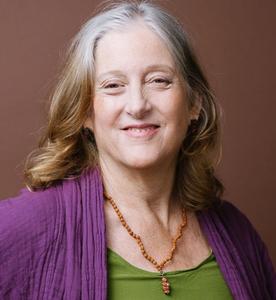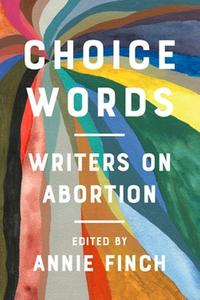
|
|
| photo: Kate Warren | |
Annie Finch is a feminist poet, nonfiction writer, translator, editor and critic who lives in Washington, D.C. Her books include The Poetry Witch Little Book of Spells, Spells: New and Selected Poems, A Poet's Craft, Calendars (shortlisted for the Foreword Poetry Book of the Year Award) and Among the Goddesses, which received the Sarasvati Award for Poetry. She is the editor of Choice Words: Writers on Abortion, out now from Haymarket Books.
On your nightstand now:
The Goddess Companion by Patricia Monaghan, which is always near my bed. Collections by two poets I met on a recent trip to India: Scripted in the Streams by Rati Saxena and Love Without a Story by Arundhathi Subramaniam. Two books that are inspiring a memoir I'm writing: Crazy Brave by Joy Harjo and Why Be Happy When You Could Be Normal by Jeanette Winterson.
Favorite book when you were a child:
The Middle Moffat by Eleanor Estes. Much later, I realized that the heroine, Jane, is a future writer. Recently, I realized she's also a future feminist.
Your top five authors:
Audre Lorde. A model of poetic genius, feminist activism and the courage to transform personal experience into a force for the greater good.
Patricia Monaghan. A brilliant poet and author, landscape-altering editor, visionary feminist writer and life-revolutionary.
William Butler Yeats. His expression of a multifaceted yet unified vision through lyrical, narrative and dramatic poetry, theater, editing, literary criticism and political activism inspires me to honor all the parts of my own work.
Langston Hughes. A magnificent poet who embraced the poet's capacity to shape culture, sharing without stint his exuberant gifts as playwright, music collaborator, novelist, short story writer, essayist and librettist.
Emily Dickinson. The poet whose words function for me most reliably as an oracle or koan; they are so purely themselves.
Book you've faked reading:
Moby-Dick, faked twice: first in high school and then when it was on my Ph.D. reading list at Stanford. I've loved other works by Melville, but I literally could not stomach this one; my body forced me to stop reading it. When I was going on the academic job market, it became a household joke that I couldn't accept a professorship where I'd be expected to teach it.
 Book you're an evangelist for:
Book you're an evangelist for:
The Untouched Key by Alice Miller. I'm quite sure that if everyone could absorb this magnificent little book, the world's problems would be solved. Runner up: The Serpent and the Goddess by Mary Condren, a herstorical case study of the systematic destruction of a matricultural society--with dismantling of women's reproductive freedom as the central weapon.
Book you've bought for the cover:
A pocket paperback edition of Longfellow's Evangeline printed in the late 1950s, with a luridly bright cover of a hunky Gabriel and passionate Evangeline.
Book you hid from your parents:
I didn't have to hide anything, because my family gifted me with invisibility. But the books that felt so private I would have hidden them if needed were Edward Eager's books about children entering the world of magic and discovering its rules.
Book that changed your life:
When God Was a Woman by Merlin Stone. I was already a feminist--thanks to Anne Wilson Schaef's Women's Reality and Gilbert and Gubar's The Madwoman in the Attic--but this book gave me permission to turn things around exactly the way I needed to do to become happy.
Five books you'll never part with:
Matriarchal Societies by Heide Goettner-Abendroth, Audre Lorde's The Black Unicorn, Edna St. Vincent Millay's Selected Poems (the new Yale University Press edition), The Timeless Way of Building by Christopher Alexander, Wickedary by Mary Daly.
Which character you most relate to:
A composite of layers, added between the ages of nine and 20: Harriet the Spy, Anthea from The Phoenix and the Carpet, Jo from Little Women, Franny from Franny and Zooey--and the speaker of Hart Crane's The Bridge.
Book you most want to read again for the first time:
The Red-Haired Girl from the Bog by Patricia Monaghan.
Book that inspired you to edit Choice Words: Writers on Abortion:
Good Woman by Lucille Clifton, which contains "the lost baby poem." After I had an abortion in 1999, this poem, along with Gwendolyn Brooks's "the mother," gave me a taste of how vital it was to read great literature about abortion--and inspired a 20-year hunt for more!

